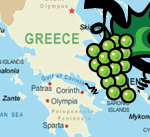 As we see new growth everywhere, we also seek new experiences, and in the wine world one good choice is wines from Greece. They are generally lighter-styled and very bright, with fresh and clean tastes.
As we see new growth everywhere, we also seek new experiences, and in the wine world one good choice is wines from Greece. They are generally lighter-styled and very bright, with fresh and clean tastes.
By Lou Campoli
 As we see new growth everywhere, we also seek new experiences, and in the wine world one good choice is wines from Greece. They are generally lighter-styled and very bright, with fresh and clean tastes.
As we see new growth everywhere, we also seek new experiences, and in the wine world one good choice is wines from Greece. They are generally lighter-styled and very bright, with fresh and clean tastes.
Wines have been made in Greece for about 6,000 years. For most of that time only local grape varieties were used, grapes we can barely pronounce. More recently, international grapes such as syrah and viognier have been planted. Greece has a range of climates, which enables a wide variety in the grapes planted and the styles of the resulting wines.
Probably the most noted wine produced in Greece is Retsina. For those who have never tasted Retsina, this description won’t make much sense — it smells and tastes like pine tar. In the days of storing wine in amphorae, a layer of pine resin on top of the wine kept it from oxidizing, while imparting a resin aroma. Once barrels and bottles came into use, the Greeks, now accustomed to that flavor, continued to add traces of pine resin to the wine as it fermented. Savatiano is the predominant white grape used in Retsina. Like Scotch, Retsina is an acquired taste; the one from Domaine Vassiliou is a good place to start.
Fortunately, white and red wines with familiar tastes are also made there.
Domaine Spiropoulos produces a certified organic sparkling wine, Ode Panos, from moschofilero that is slightly off dry with pleasant floral notes. It is excellent too as an apéritif and with appetizers (mezedes).
Mantinia, a white wine made by Domaine Spiropoulos from moschofilero, is dry and floral with great acidity.
Thalassitis, made by GAI’A Wines on Santorini, is a white wine made from assyrtiko that shows crisp, refreshing citrus and grapefruit flavors.
Robola Cellar Select from Gentilini Winery in Cephalonia is a white wine made entirely from robola. It shows refreshing peach and citrus flavors.
For familiar white wines, Domaine Harlaftis makes a chardonnay that shows nice tropical fruit flavors and good acidity without any oaky vanilla overtones. Mercouri Estate in Peloponnese produces a viognier that exhibits fresh floral and fruit flavors. Mercouri also makes a white wine called Foloi from roditis and viognier that is soft and smooth, with honeyed notes.
Using international grapes, Lampadias Rosé from Mercouri Estate is a blend of grenache and syrah. It is dry and full-flavored, with bright cherry notes. Enjoy it with white meats, poultry, ham, grilled seafood, and salads.
Meliasto Rosé, a blend of white moschofilero and red agiorgitiko from Domaine Spiropoulos, is dry with flavorful cherry and raspberry notes. Serve it with salads, ham, and poultry dishes.
Thymiopoulos Vineyards produces a Young Vines red wine in Naoussa from xinomavro that is light-bodied with red cherry flavors. Serve it with white meat and poultry dishes. Thymiopoulos also produces a xinomavro wine called Uranos (“earth and sky”) that is fuller bodied with deeper cherry flavors and a long finish. Enjoy with lamb and red meat dishes.
Nemeion Reserve Nemea, a red wine produced by Domaine Vassiliou from agiorgitiko, is round and full-bodied, with bright cherry flavors. This producer’s regular Nemea is also excellent, showing youthful cherry and red berry flavors. Serve it with red meat and game dishes.
Gentilini Winery, in Cephalonia, makes a red wine called Eclipse entirely from mavrodaphne. It is full-bodied with deep red berry flavors. Serve it with red meat dishes, game, and aged cheeses.
Gentilini also produces a syrah that is blended with a bit of mavrodaphne. Dark cherry flavors abound and the long finish shows peppery notes. Enjoy with meat and vegetable dishes, game, and aged cheeses.
A great way to end the meal is with white Muscat (muscat blanc à petits grains) from the island of Samos. It comes in two styles. The Union of Winemaking Cooperatives of Samos produces both, named Nectar and Anthemis. Nectar is not fortified and is sweet and refreshing. Serve it with fruit desserts. Anthemis is fortified with grape spirits and shows more intense fruit flavors. Enjoy it with fruit desserts and blue cheese.
For Easter dinner, try the Greek agiorgitiko and assyrtiko wines, or syrah and viognier wines from elsewhere. Unfortunately, Greece does not produce kosher wines, so for Passover, try the pinot noir and syrah from Hagafen Cellars in California.
Enjoy the holidays and this absolutely beautiful time of year. Here’s to new and wonderful adventures.















